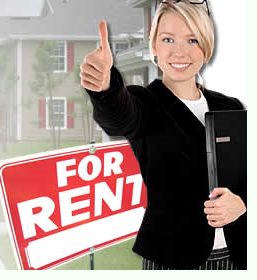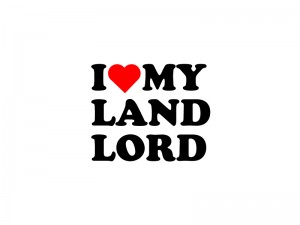Posted by Teresa on June 10, 2009 under Landlord Tips, Marketing for Landlords | 

Do you have a property you can’t seem to rent? You cleaned and repainted after the last tenant moved out. You advertised it well, and even showed it a few times to prospective tenants. But it’s still not leased.
Perhaps it’s been a couple of years since you’ve had an empty unit. There is a lot of competition for rental units right now. Even if you think you’ve done everything right to get your property ready for its next tenant, you might need to put in some extra effort.
Ready to ramp things up a bit? Try these ideas to make your property and your lease offer more appealing to prospective tenants.
Check out the curb appeal of your property. Look at it from the street, with an objective eye. What can you do to make it more appealing?
1. Paint the front door. Consider painting the door a welcoming or unusual color, such as bright red. Think paint with “punch.”
2. Plant new shrubs or flowers. This is a small investment that can really make your place look well-cared for and inviting.
3. Replace any cracked or broken glass or screens. Even if they are not noticeable from the inside, you can be sure people are noticing them from the outside.
4. Does the building need painting? This can be a large undertaking. You may be able to sign tenants with a promise to repaint once you they move in. Be sure to follow-through on any such agreement.
5. How about just the trim paint? It doesn’t take much money or effort to scrape off the chipped paint and repaint the trim. And it makes a big difference in appearance!
6. Are the windows outdated? Not only do old windows look bad, they are less energy efficient.
Incentivize your tenants to sign a lease. Of course, you don’t want to give away the store. You still want well-qualified and properly screened tenants. But if you find a great tenant, offer them a little something extra if you really want to get your property rented.
1. Waive the rent. Offer to waive one month’s rent: first month, last month, or next February—it doesn’t matter when you choose. Be sure they understand this bonus comes only with a one-year lease.
2. Pay their utilities. Offer to provide free cable, or water for the length of the lease. This is easier on you if it’s a flat-monthly-rate utility, rather than electricity or gas, that you have no control over.
3. Buy them a gift. A new grill for the patio, a TV, washer/dryer, or wireless internet might just the incentive a prospective tenant needs. Of course, you get to decide whether it belongs to the tenant or stays with the rental property!
Don’t hesitate to look at your property objectively and to sweeten the offering in order to take down that “For Rent” sign as soon as possible!
Posted by Teresa on June 9, 2009 under Landlord Tips, Tenant Screening & Background Checks | 
 A landlord we know received this note from a tenant:
A landlord we know received this note from a tenant:
“Dear Ms. Landlord,
In part because of the current economy, I am having difficulty making ends meet. I’d like to be able to afford to take care of myself and my son properly, and one way I’ve considered is to take on a roommate.
I realize my lease is in my name only and currently you allow only my son and me to live here. Since we have an extra bedroom, would you have any problem with my bringing a housemate into our home?”
What would you do? Covering a few basics with your tenant can make this an easier process. While it is solely up to you as a landlord to allow your tenants to have roommates or not, it can lead to better retention and happier tenants—definitely a win-win situation!
1. Let your tenant know that it’s not as easy as just adding another person to an existing lease. It is a better idea to start with a new lease application under both names to minimize your risk. Your tenant may be relieved to understand that he or she is not responsible for the roommate, who has their own legal obligations once they sign the new lease.
2. You should consider raising the rent. Your tenant may not be prepared for this, but explaining that an additional person means more wear and tear on your property makes an increase in rent completely reasonable.
3. Are utilities included in the current rent? If so, you’ll definitely need to adjust the rent for additional usage, or consider changing the terms of the new lease to bill them separately. This could also be the time to have your tenants initiate service themselves.
4. Screening potential roommates. If you regularly prescreen all applicants, your current tenant should be expecting that any roommate will need to undergo credit, rental, and job history screening. If you have not been in the habit of screening tenants, you are completely within your rights to start doing so under a new lease agreement—and you should!
5. You probably are already aware, but if you’re not sure about your local occupancy laws, check them out. Some localities prohibit more than a certain number of unrelated adults to share a dwelling.
6. Be clear about who pays the rent. Some landlords accept multiple checks; others do not. It is certainly easier to deal with one check, and to avoid the hassle that could occur if one roommate pays promptly and the other does not.
While adding a roommate to a tenant’s unit can create a stack of new paperwork, it can also add to your profitability—and relieve your tenant’s money woes. Helping your tenants stick around is ultimately in your favor!
Posted by Teresa on June 1, 2009 under Landlord Tips | 

As a landlord, you expect a certain code of conduct from your tenants. It may seem obvious that respecting property, fellow tenants, and neighbors is expected from everybody. But any landlord knows that many folks need to have the rules spelled out (and even then, it can be a challenge getting their cooperation!). Make things easier on yourself and your tenants by providing a written list of rules that you require your tenants to follow.
When establishing your “house rules,” think in terms of areas pertaining to your rental property, so you can be sure to cover everything. Here are some examples of tenant rules that you might want to consider:
Exterior Areas
Garbage: Inform your tenants they must use provided garbage and recycling receptacles. State trash pickup dates, and list any fees that will be imposed for extra trash or improper disposal, according to your municipal or private trash pickup service’s rates.
Automobile and Bicycle Parking, Maintenance: Outline exactly where the tenant and their guests may and may not park their cars. Specify if a parking area for bikes is provided, or if tenants must secure them in their individual units. State whether or not automobile maintenance is allowed on the property.
Fire Hazards: State where tenants may and may not use grills or other hazardous outdoor equipment (decks, porches, etc.). You may need to restrict their use to concrete pads, or to keep them a certain distance from the building. It may seem obvious, but do state whether you allow your tenants to have bonfires, fire pits, or burn garbage on the property. Specify where gas and propane tanks should be stored.
Swimming Pool: Many municipalities require posted safety rules for pool areas. Always follow your local and state laws regarding a swimming pool. Add your own rules for who may use the pool (tenants only, or tenants and guests), age requirements, hours of operation, swimsuit guidelines (i.e., no cutoff jeans), and noise and food/beverage restrictions.
Interior Areas
Safety: State whether tenants are allowed to change any door or window locks (most landlords do not allow this). Inform your tenants that smoke detectors, fire extinguishers, and electrical outlets and/or wiring may not be tampered with. Cover the legal rules of your property: illegal drug use or sale is not allowed, tenants are not to verbally or physically threaten other tenants, and state any weapon restrictions, i.e., no guns allowed on the property.
Heat sources: if you allow space heaters, be sure to outline where and how they can be used. Or, state that they are not allowed on your property. Outline rules and guidelines for fireplaces, too. And be sure to schedule annual inspections and cleanings for your units with working fireplaces!
Alterations: Specify whether or not your tenants are allowed to change the interior of the unit. Many landlords allow small alterations, like painting, as long as the color is pre-approved and the space is returned to the original color prior to the tenant moving out. However, most landlords have stories of repainting rental units after tenants fail to do so!
Noise: Excess noise could be the most common tenant complaint. Noise levels must be addressed and enforced by the landlord to prevent problems. You can establish quiet hours, from 10:00 p.m. to 8:00 a.m., for example, but be aware that night shift workers will have problems with daytime noise, too.
Tenant Guests: You may state when and how many visitors are allowed. Inform tenants they will be responsible for visitors’ behavior and any damage caused by non-leaseholders who visit the property.
Pets: You either allow them or you don’t. If pets are allowed, you’ll want to establish a separate pet policy for your tenants with pets.
Your list of tenant rules may be short and sweet, or long and detailed. The important things to remember are that they must be provided to every tenant; the tenant must sign that they received a copy; and the rules must be enforced equally among all tenants.
For more landlord resources, including forms and information on
tenant screening, turn to
E-Renter.com. You’ll know that you have the best possible tenants when you
prescreen tenants.
Posted by Teresa on May 28, 2009 under Landlord Tips, Tenant Screening & Background Checks | 

Our landlord friend, Marjorie, has a decision to make. She’s been advertising her rental property, and so far, the prospective tenants just aren’t up to her standards. Screening has revealed poor credit histories, previous evictions, and less-than-stellar job histories on most of the applicants; except one, who has a sound job and credit history and raves from former landlords. The only problem? The “perfect tenant” doesn’t want to sign a one-year lease.
Marjorie first thought of a six-month lease, with an option to go month-to-month after. Marjorie knows that a month-to-month lease is a legal contract, and that having it written by a professional is vital in order to provide her the best possible protection. She understands that at the end of any month, the tenant can leave, or she can choose not to renew the lease. If neither side objects, the lease renews at the end of each month.
But Marjorie’s not sure about the pros and cons of a month-to-month lease. Would it be better to compromise for this great tenant, or keep looking for someone who is willing to enter into the one-year agreement Marjorie prefers?
Pros:
- You can attract a larger pool of good tenants who can’t sign longer agreements based on a job situation, house sale, or other legitimate reasons.
- If you are in a college town or popular vacation spot, you can offer short-term leases to vacationers and students.
- If the “perfect tenant” turns out to be noisy, or breaks any other rules, you only have to put up with them for one month.
- You can charge a premium rent for the higher risk and convenience of a month-to-month agreement.
- If the tenant is late paying rent, it’s easier to evict.
- You can catch property damage before it gets out of hand.
- You can raise the rent as you wish.
- If the tenant turns out to be a good fit, you can always renegotiate a longer lease.
Cons:
- The tenant can leave at the end of any month, usually giving a 30-day notice. This can interrupt cash flow and cost you more time and money to replace them.
That’s really it? Only one “con?” Yes—when thinking about the flexibility of a month-to month lease, the only potential problem for the landlord is replacing the tenant after a shorter-than-usual period of time. But remember, most people don’t like to move, so it’s not likely that your new tenant will be doing so right away.
In the end, Marjorie decided to go with the month-to-month lease. She added a guarantee that the rent would not increase for six months, which made her new tenant even happier. Marjorie is one smart landlord!
Posted by Teresa on May 26, 2009 under Landlord Tips, Marketing for Landlords, Screening and Background Checks, Tenant Credit Checks, Tenant Screening & Background Checks | 

When it comes to written communication, the “Two Cs” should be top-of-mind: Clear and Concise. This is particularly important when composing an ad for a rental unit. Follow these steps to an easy, effective ad:
1. Attract attention. Make your newspaper ad stand out by adding a border or bold headline. On Craigslist, the descriptor is short, so use creative language: “Amazing house in Oak Tree neighborhood,” “Best $500 apartment in town,” or “Hardwood floors, 3BR, super-quiet” are all ways to capture attention quickly.
2. Be clear. At a minimum, list the number of bedrooms and baths, the neighborhood, parking information, and the monthly rent. State that you check previous landlords, criminal background, and credit history. You can eliminate unqualified tenants easily with a well-worded ad.
3. Use photos. A picture is truly worth a thousand words. A photo can instantly tell a prospective tenant whether your rental property is the right place for them.
4. Don’t skip the details. Do you include utilities with the rent? Say so! Are you okay with pets? Put it in the ad. Are you completely against smoking in your rental home? Tell us! Tell readers about the schools, whether a grocery store is close by, and all about the beautiful landscaping. Brag about your place, and you’ll get enthusiastic responses. You want the most qualified tenants to act upon finding your ad.
5. Make it easy to respond. Put your primary phone number in the ad, as well as an email address. For Craigslist ads, all responses will be through the site’s secure email unless you add a telephone number in the ad.
6. State a good time to call. You can certainly list what time you will accept telephone calls from prospective tenants. And if a call is made outside that time, the caller either didn’t notice, or didn’t care that you requested otherwise. It’s a good screening mechanism to find the tenants you’ll get along with best.
An effective ad is the first step in prescreening tenants. You can eliminate the ones you don’t want and attract the ones you do by being clear, descriptive, and detailed in your newspaper or online For Rent ad.
For more landlord resources, including everything you need to know about
tenant screening, turn to
E-Renter.com. You’ll know that you have the best possible tenants when you
prescreen tenants.
Posted by Teresa on May 20, 2009 under Landlord Tips, Rents and Deposits | 
 If you’re a landlord, we hope you’ve already established solid policies and procedures for collecting rent and shared them with your tenants—in writing. If not, go do that immediately and come back when you’re through!
If you’re a landlord, we hope you’ve already established solid policies and procedures for collecting rent and shared them with your tenants—in writing. If not, go do that immediately and come back when you’re through!
For the rest of you, here are a few pointers for collecting rent that may help keep your blood pressure—and your bottom line—at a healthy level.
1. Do not allow multiple checks: Roommates might prefer to pay you separately for their share of the rent. The trouble begins when someone’s division is wrong or not all roommates pay promptly. It is not your responsibility to track down multiple tenants for rent on the same unit. Require them to figure out who owes whom and to present one check for the rent.
2. Remind tenants when rent is due: You could provide monthly invoices or reminders, or even a rent payment coupon book to help your tenants keep track of when their rent is due. For routinely slow payers, a phone call five days before rent is due is reasonable.
3. Contact tenants immediately if rent is late: Stay calm and businesslike, but do not hesitate to call tenants about late payments. Determine the cause of the problem, and inform them of their options.
4. Avoid accepting partial payments: If an excellent tenant requests a chance to pay in part, you can consider allowing this, but make them aware it is a one-time deal. And then, present the tenant with paperwork to sign: either an agreement to pay the rest by a specific date or a legal rent demand notice. And remember that in most states, accepting partial payments voids any prior legal notices for nonpayment of rent.
5. Offer small incentives for prompt payments: It may seem like a stretch in a down economy, but times like this are perfect for rewarding your tenants who pay on time. Purchase pizza or movie rental gift certificates and mail or hand them to your prompt paying tenants. Even small gestures encourage more good behavior.
6. Don’t consider a cash discount: Rather than charging a late fee, some landlords set the rent higher, and then offer a discount to entice tenants to pay rent on time. The courts have historically frowned upon this. If you want tenants who pay on time, then prescreening tenants is a better practice.
7. Don’t redeposit bad checks: If a tenant bounces a check, it is best to require a cashier’s check or money order to replace it. (And for all subsequent rent checks from that tenant.) But if they swear the bad check is now good, rather than re-depositing it, go to the tenant’s bank and either cash it or have them certify it so you can deposit it into your account without worry.
8. Don’t waive late charges: There is no good way to bend the rules. You have established policies to protect yourself from lawsuits—so follow them. Treating a tenant more favorably than others can lead to accusations of discrimination. Waiving late charges will mean you cannot reasonably begin charging them again.
9. Keep late charges and returned check charges reasonable: Many states have limits on how much a landlord can charge for late fees. Check out your local laws, too. Returned check fees should be based on what your bank charges you, plus enough to reimburse your time to deal with it. And remember, if your tenant makes good on a bounced check after your standard grace period, they are responsible for late fees as well.
10. Keep good records: If your tenants pay by mail, record the date you receive their checks. If they pay in person, give them a receipt. If you receive a rent payment by mail after the due date, keep the envelope’s postmark in case your tenant disputes a late charge.
Posted by Teresa on May 13, 2009 under Fair Housing Act, Landlord and Tenant FAQs, Landlord Tenant Lawsuits | 

If you are a landlord, reducing risk should be an ongoing part of your business. Nobody likes to think about lawsuits and liability insurance, but the facts are that rental property owners are sued every day. You cannot control every liability that comes with rental property ownership, but you can minimize risk with awareness and planning.
Smart landlords know that keeping their properties in good repair and prescreening tenants are two ways to reduce the liability of owning income property. But there are other areas you may not be aware of that could be putting you at risk. Protect yourself and your assets by controlling your actions in these areas.
Hiring workers: Both federal and state government entities actively search for employers who don’t properly document their employees. Landlords who hire workers fitting the description of “employee,” who then pay them in cash and do not withhold proper taxes, unemployment and insurance, are breaking the law.
Employers who pay “off the books” are subject to back taxes and penalties if they get caught—and the IRS and state agencies are definitely on the lookout for these folks. Your best bet is to hire contractors and repair people who are self-employed, with their own corporations. Keep their business cards and check out their form of ownership. Require proof of insurance, too.
Discrimination in renting: Federal laws make it illegal to discriminate when renting on the basis of race, color, religion, nationality, familial status, age, gender, and disabled status. Your local and state laws may protect additional groups. Even if you do not intend to discriminate, you must be aware of how the laws affect your advertising and rental procedures.
For example, you should avoid advertising your property as being close to a church, because you could be sending the message that you prefer churchgoing tenants. You cannot advertise that your property is “perfect for a nice family,” because you could be seen as discriminating against single people. Avoid asking personal questions as a rule. You cannot rent based on tenants’ marital status, whether or not they have children, or how they choose to worship—or not.
We have covered renting to persons with disabilities in this blog. But while most landlords know that a person in a wheelchair must be accommodated, keep in mind that it is discriminatory to ask about the disability. All disabilities—even those that are not obvious—are protected under the law. Knowing how you must comply and keeping good records are both vital to all landlords.
Improper legal documentation: It may be tempting to use real estate forms that you buy from an office supply store or borrow from a friend, but it’s in your best interests to cover yourself thoroughly before signing any legal documents. Sure, you can download forms from the internet, but have them reviewed by a real estate attorney before you start using them for your tenants.
Be sure to periodically update your forms, too. Outdated forms could put you at risk if new housing laws have been passed. Plus, you may be asking tenants to sign agreements that are unenforceable.
Respecting tenants’ rights to privacy: Landlords must avoid entering properties without proper notice. In most states, it is not okay to stop by unannounced to check on things or make repairs. It’s not worth it if this type of action results in a tenant being released from the rental agreement or is awarded damages.
Reducing your liability and staying out of court will definitely increase your bottom line! So, keep up with changing laws, stay informed, and always ask yourself if there is a better way to do things.
For more landlord resources, including everything you need to know about
tenant screening, turn to
E-Renter.com. You’ll know that you have the best possible tenants when you
prescreen tenants.
Posted by Teresa on May 7, 2009 under Landlord Tips | 

The good news is that at least as far as Google is concerned, far more people express love than hate for their landlords. A Google search for “love my landlord” yields 432,000 results, while “hate my landlord” yields a mere 163,000 results. There’s absolutely nothing scientific about this statistic, but if you’re a landlord, maybe it will make you feel better about yourself!
Combing through hundreds of websites, we compiled our list of popular rants and raves. Maybe it will give you ideas about what to do, and maybe more importantly, what not to do when dealing with your tenants!
The Raves, or Why I Love my Landlord:
- My landlord fixes/replaces things when they need it
- My landlord leaves me alone
- He gives me what I need when I need it
- She hasn’t raised the rent when she could have
- My landlord lets me have my dog/cat/bird/iguana
- She treats me fairly
- He is kind
- He keeps the property clean
- She doesn’t put up with noisy/bad tenants
- My landlord gives me plenty of notice for inspections and repairs
The raves seem pretty simple, don’t they?. Tenants want good communication and to feel respected. They also like to be able to keep pets and to keep renting without rent increases! Of course, going a little beyond the expected is always appreciated. Now for the rants. . .
The Rants, or Why I Hate my Landlord:
- My landlord turns off the water with no notice
- My landlord won’t call for emergency repairs after normal business hours because it’s too expensive
- My emergencies are not my landlord’s emergencies: over 24 hours without water is too much
- Our building/property is a mess
- Things don’t work properly: electrical outlets, stove burners, a/c units, heat
- The electrical system is not safe
- My landlord hires creepy repair/maintenance workers
- My landlord says “absolutely no pets”
- They won’t give me even one day’s grace period on the rent
- My landlord favors some tenants over others
- My property management company came to my apartment four times over the last two weeks without an appointment
- My landlord lets himself into my apartment without my permission
- My landlord makes me feel like I’m being watched
- I have ants/roaches/mice/creepy crawlies in my apartment
- They’re showing my apartment to potential new tenants at all hours
We did find a few more rants than raves. In fact, much of what is out there is not suitable for this blog! Landlords who have good relationships with their tenants would probably never dream of some of these behaviors.
Overall, the landlord lovers seem genuinely happy with their relationships. One said, “I love my landlord. I wish I could find a man like her.”
What type of landlord are you? Are your tenants raving or ranting to the world? Knowing what your tenants like—and what they don’t—can help inspire love, loyalty, and great tenant behavior. And maybe your tenants will soon be sharing all the reasons why “I love my landlord.”
Posted by Teresa on May 5, 2009 under Landlord Tips, Screening and Background Checks | 

Maintaining rental property can be a big challenge for landlords. There is always preventative maintenance that should be performed to keep your rental units in top shape. And then there are the emergency repairs that require your attention now.
If everyone around you clears the room when you start handling power tools, you should definitely hire an expert to help you with rental property maintenance. Even if you consider yourself reasonably handy, an endless to-do list probably means you need some help. Sure, you can save money by performing your own repairs and maintenance, but is that the best use of your time?
Finding the right balance between hiring expert help and breaking the bank isn’t easy. Consider these tips for finding and hiring a professional to help you keep your income property safe and functioning properly.
First, determine whether you need to hire out for individual projects, or if you’d rather enter into a longer-term contract for regular maintenance and repairs.
Research your local builder and remodeler organizations—they’re a great source for contractors and repair people. If you contact companies who cannot help you—for example, the work you need is below their ideal level—ask for a referral to an individuals or subcontractors with excellent track records and experience in rental property maintenance and repair.
Once you have contacted several individual contractors or repair people, conduct your due diligence: make certain they have all the required licenses and insurance in place, meet with them to ensure you can establish a good rapport, and ask for references. Your state licensing entity can provide current insurance and bond information. And don’t neglect to contact their references!
Set your job specifications and obtain proposals from each contractor. Award the project based on pricing, experience level, and references, keeping in mind the lowest price may not be the best choice. Work with the firm or individual you feel most comfortable with.
Be sure you have a clear understanding about payments and contract details. Do not fall prey to a contractor who requests payment in full before the job begins. Deposits and progress billing are reasonable, depending on the size of the job. You should withhold at least 10% of the contract price until the entire job is completed to your satisfaction and specifications. And make sure they clean up the job site, too!
And finally, be sure to properly supervise your repair and maintenance people. Do not allow anyone to have unlimited, unsupervised access to your rental property. For more security, consider background screening checks on any individuals you hire to perform work on your behalf. Mitigate your liability and keep your tenants safe by knowing exactly who you are hiring.
For more landlord resources, including everything you need to know about
tenant screening, turn to
E-Renter.com. You’ll know that you have the best possible tenants when you
prescreen tenants.
Posted by Teresa on April 29, 2009 under Landlord Tips | 
 Are you thinking, “it’s a little late for tax advice?” Well, read on, because this information is intended to make April 2010 a little easier to face by helping you save money. Remember, we’re not tax professionals, so check with your tax advisor or a qualified tax planner for the details about what you can and cannot deduct. In general, track and keep good records of these expenses so you can deduct them from your rental income next year!
Are you thinking, “it’s a little late for tax advice?” Well, read on, because this information is intended to make April 2010 a little easier to face by helping you save money. Remember, we’re not tax professionals, so check with your tax advisor or a qualified tax planner for the details about what you can and cannot deduct. In general, track and keep good records of these expenses so you can deduct them from your rental income next year!
Interest: From mortgage interest on your rental property, to credit card interest on purchases made on behalf of the property, most interest is deductible. If you don’t already, consider acquiring a separate credit card for your rental property to make record keeping easier.
Advertising: All expenses to advertise your rental property are deductible. This includes newspaper and online rental ads, as well as website expenses.
Professional Fees: Legal and accounting expenses, as well as expenses for professional management, advertising and web design, or cleaning and maintenance help can be deducted.
Depreciation: You cannot deduct the full cost of the rental home in the year it is purchased. Instead, an equal portion is deducted each year over 27.5 years.
Travel: Local and long-distance travel related to your rental property is deductible. If you have a vehicle dedicated only to the rental property, then all expenses (gas, insurance, repairs, and maintenance) are deductible. If not, then keep good records for property management-related trips. Record the mileage for visits to your rental property to collect rent, inspect, or make repairs. For long-distance travel, track mileage or airfare, lodging, and meal expenses. To avoid any problems with the IRS, don’t claim deductions without the receipts to back them up!
Home Office: Expenses related to maintaining a home office, workshop, or storage areas to manage your rental property are deductible. There are minimum requirements to meet, so be sure to follow your tax professional’s guidelines.
Theft or Casualty Losses: In case of theft, vandalism, or events like floods or fires, a portion of your loss may be tax deductible. Your insurance coverage will likely impact the amount you can deduct.
Insurance: Speaking of insurance, all premiums you pay to cover your property are deductible, including fire, theft, flood, and liability insurance.
Miscellaneous Expenses: Don’t forget to track expenses like office or household supplies, condo fees, utilities paid on behalf of your tenants, snow removal, landscaping, taxes, and repairs.
Be sure to ask your tax professional about all of these deductions—but start saving those receipts and keeping good records now. You’ll be very glad you did at tax time in 2010!
For more landlord resources, including everything you need to know about
tenant screening, turn to
E-Renter.com. You’ll know that you have the best possible tenants when you
prescreen tenants.










